Garlic offers significant cardiovascular benefits, including improved blood circulation and reduced blood pressure. This article explores garlic’s key properties, such as allicin and antioxidants, that enhance heart health. It also examines various forms of consumption, from raw and cooked garlic to supplements, to maximize these health advantages. Understanding garlic’s unique and rare attributes can further inform its role in supporting cardiovascular wellness.
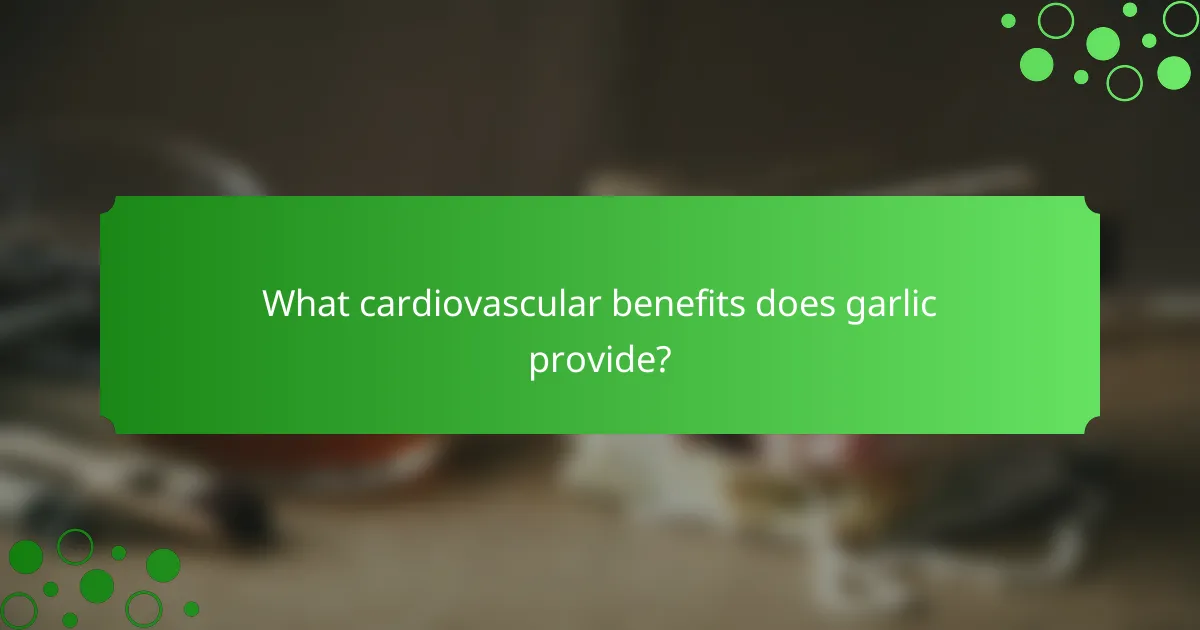
What cardiovascular benefits does garlic provide?
Garlic provides significant cardiovascular benefits, including improved blood circulation and reduced blood pressure. It contains allicin, which helps to relax blood vessels, enhancing overall heart health. Regular consumption of garlic can lower cholesterol levels, reducing the risk of heart disease. Forms of intake include raw garlic, garlic supplements, and cooked dishes.
How does garlic impact blood pressure?
Garlic can help lower blood pressure due to its active compounds. Allicin, a key component, promotes vasodilation, which relaxes blood vessels. Studies suggest that regular garlic consumption can reduce systolic and diastolic blood pressure by 8-10 mmHg. This effect is particularly pronounced in individuals with hypertension. Forms of intake include raw garlic, garlic powder, and aged garlic extract, each offering varying levels of efficacy.
What role does garlic play in cholesterol management?
Garlic plays a significant role in cholesterol management by potentially lowering total and LDL cholesterol levels. Its active compounds, such as allicin, contribute to improved cardiovascular health. Studies indicate that regular garlic consumption can reduce cholesterol by approximately 10-15%. Garlic is commonly consumed raw, in supplements, or as a cooked ingredient, providing versatility in dietary inclusion.
How can garlic reduce the risk of heart disease?
Garlic can significantly reduce the risk of heart disease through its ability to lower blood pressure and cholesterol levels. It contains allicin, a compound that promotes cardiovascular health by improving blood circulation. Regular consumption of garlic, whether raw, cooked, or in supplement form, can enhance heart function and reduce arterial plaque buildup. Studies indicate that daily intake of garlic may lower total cholesterol by 10-15% and systolic blood pressure by 8-12 mmHg.
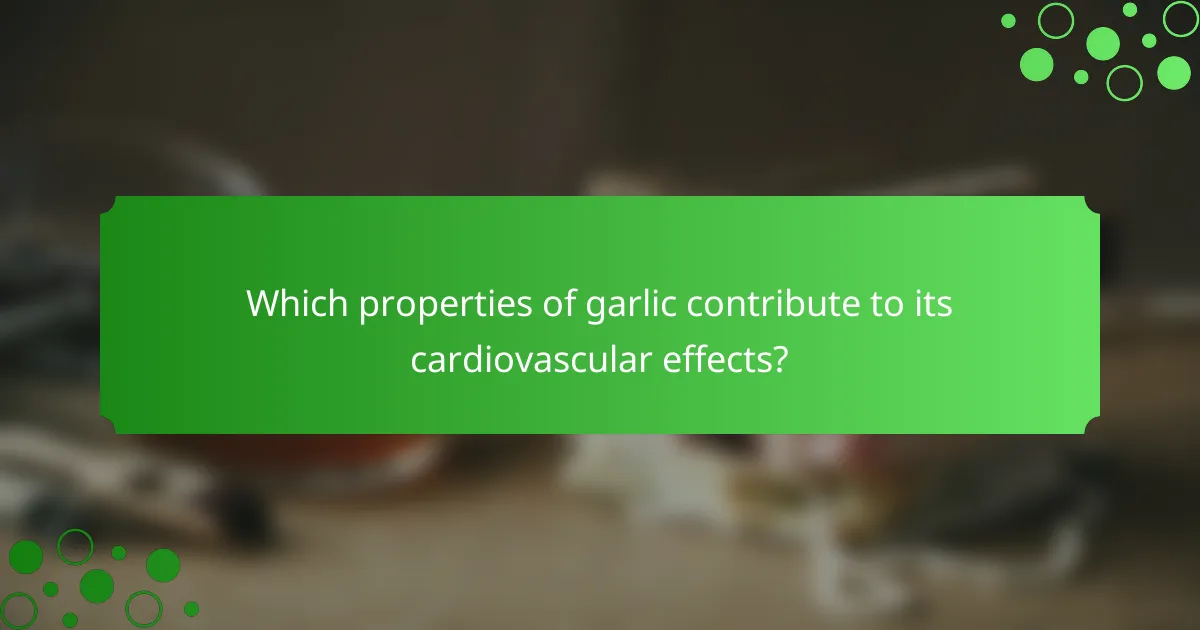
Which properties of garlic contribute to its cardiovascular effects?
Garlic contains properties that enhance cardiovascular health, primarily through its ability to lower blood pressure and cholesterol levels. Key compounds include allicin, which promotes blood vessel dilation, and antioxidants that reduce oxidative stress. These properties collectively contribute to improved heart function and reduced risk of cardiovascular diseases. Regular consumption of garlic, whether raw, cooked, or in supplement form, can help maximize these benefits.
What active compounds in garlic promote heart health?
Garlic contains active compounds like allicin, ajoene, and sulfur compounds that promote heart health. Allicin reduces blood pressure and lowers cholesterol levels. Ajoene has antithrombotic properties, preventing blood clots. Sulfur compounds enhance overall cardiovascular function. Regular consumption of garlic, whether raw, cooked, or in supplement form, can yield these benefits.
How does garlic’s antioxidant activity benefit cardiovascular function?
Garlic’s antioxidant activity supports cardiovascular function by reducing oxidative stress and inflammation. This leads to improved blood vessel health and better circulation. Studies indicate that garlic consumption can lower blood pressure and cholesterol levels, enhancing overall heart health. Regular intake, whether raw or cooked, maximizes these benefits.
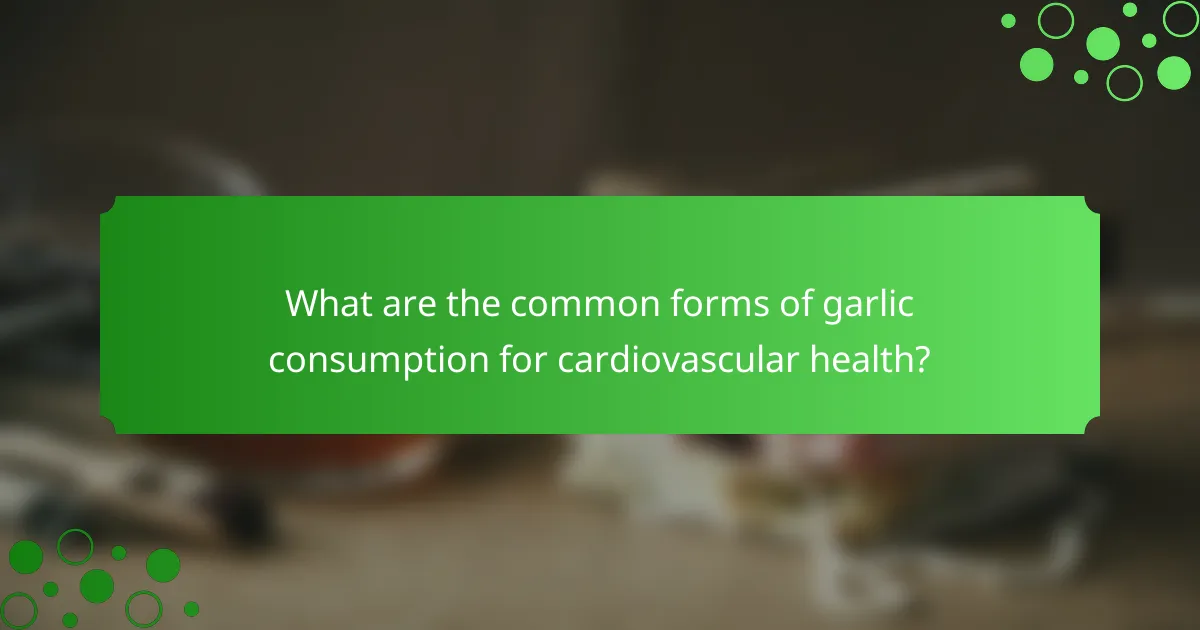
What are the common forms of garlic consumption for cardiovascular health?
Garlic can be consumed in various forms to support cardiovascular health. Common forms include raw garlic, cooked garlic, garlic powder, garlic oil, and garlic supplements.
Raw garlic retains the highest levels of beneficial compounds, such as allicin, which is known for its heart health benefits. Cooking garlic can diminish some of these compounds but still provides cardiovascular advantages. Garlic powder and garlic oil offer convenient options, while supplements allow for concentrated intake.
Incorporating these forms into a balanced diet can enhance cardiovascular health by promoting better blood circulation and reducing cholesterol levels.
How does raw garlic compare to cooked garlic in terms of benefits?
Raw garlic provides more cardiovascular benefits than cooked garlic. Raw garlic retains higher levels of allicin, a compound linked to heart health. Cooking garlic may reduce its beneficial properties but enhances flavor.
| Attribute | Raw Garlic | Cooked Garlic |
|——————-|———————-|———————|
| Allicin content | High | Moderate |
| Antioxidant levels | Higher | Lower |
| Flavor intensity | Pungent | Milder |
| Heart health impact | Stronger | Weaker |
| Culinary uses | Salad, dressing | Roasting, sautéing |
What are the benefits of garlic supplements versus fresh garlic?
Garlic supplements may offer concentrated cardiovascular benefits compared to fresh garlic. Supplements typically contain higher levels of allicin, the active compound known for reducing blood pressure and improving cholesterol levels. Fresh garlic provides additional nutrients and antioxidants that may enhance heart health through whole food consumption. Both forms can support cardiovascular wellness, but supplements might be more effective for specific health outcomes.
Which garlic-infused products are popular for heart health?
Garlic-infused products popular for heart health include garlic oil, garlic supplements, and garlic powder. These products are known for their cardiovascular benefits, such as reducing blood pressure and cholesterol levels. Garlic oil contains allicin, a compound linked to improved heart health. Garlic supplements often provide concentrated doses of these beneficial compounds. Garlic powder is a versatile option for cooking, retaining many health benefits while enhancing flavor.
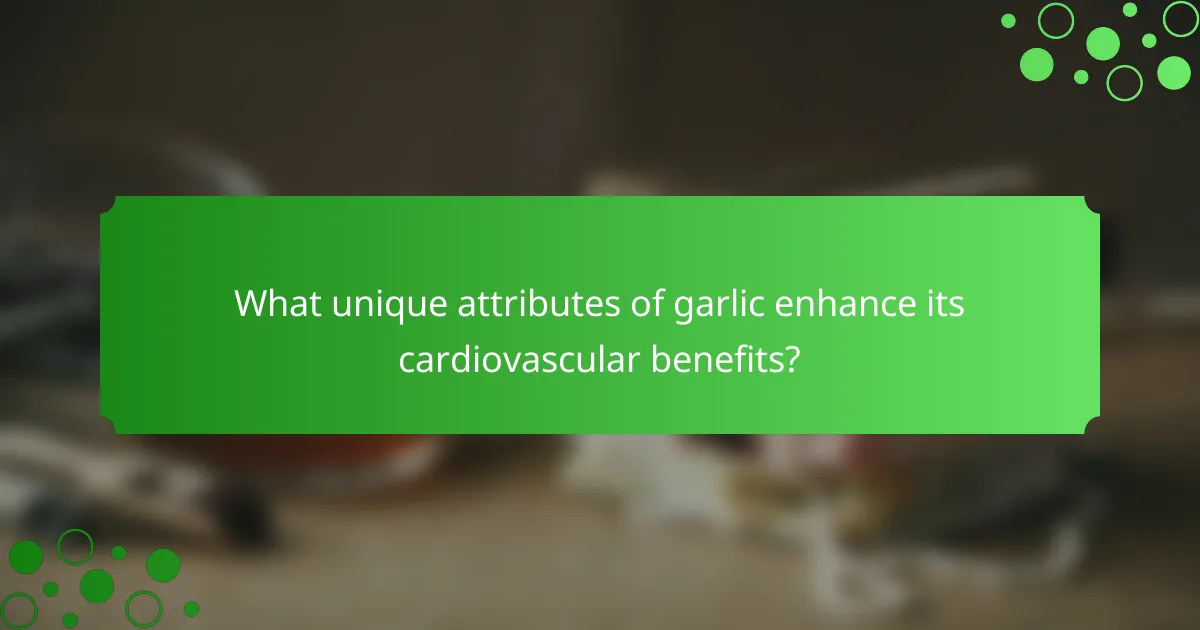
What unique attributes of garlic enhance its cardiovascular benefits?
Garlic contains unique attributes that enhance its cardiovascular benefits, such as allicin, which improves blood circulation, and sulfur compounds that help lower blood pressure. These components contribute to garlic’s ability to reduce cholesterol levels and prevent arterial plaque formation. Additionally, garlic’s antioxidant properties combat oxidative stress, further protecting heart health. Regular consumption of garlic, whether raw or in supplements, maximizes these benefits.
How does the aging process of garlic affect its health properties?
The aging process of garlic enhances its cardiovascular benefits through the formation of beneficial compounds. As garlic ages, it converts alliin to allicin, which improves heart health by reducing blood pressure and cholesterol levels. Aged garlic also contains antioxidants that further support cardiovascular function. Additionally, the health properties of aged garlic may be more potent than fresh garlic, making it a preferred form of consumption for those seeking maximum benefits.
What specific varieties of garlic are known for superior cardiovascular effects?
Certain garlic varieties, particularly black garlic and aged garlic, are recognized for their superior cardiovascular effects. Black garlic, created through fermentation, contains higher antioxidant levels, which help reduce blood pressure and improve cholesterol profiles. Aged garlic extract is noted for its unique compounds that enhance blood flow and lower arterial stiffness. Both forms are more potent than raw garlic in promoting heart health.
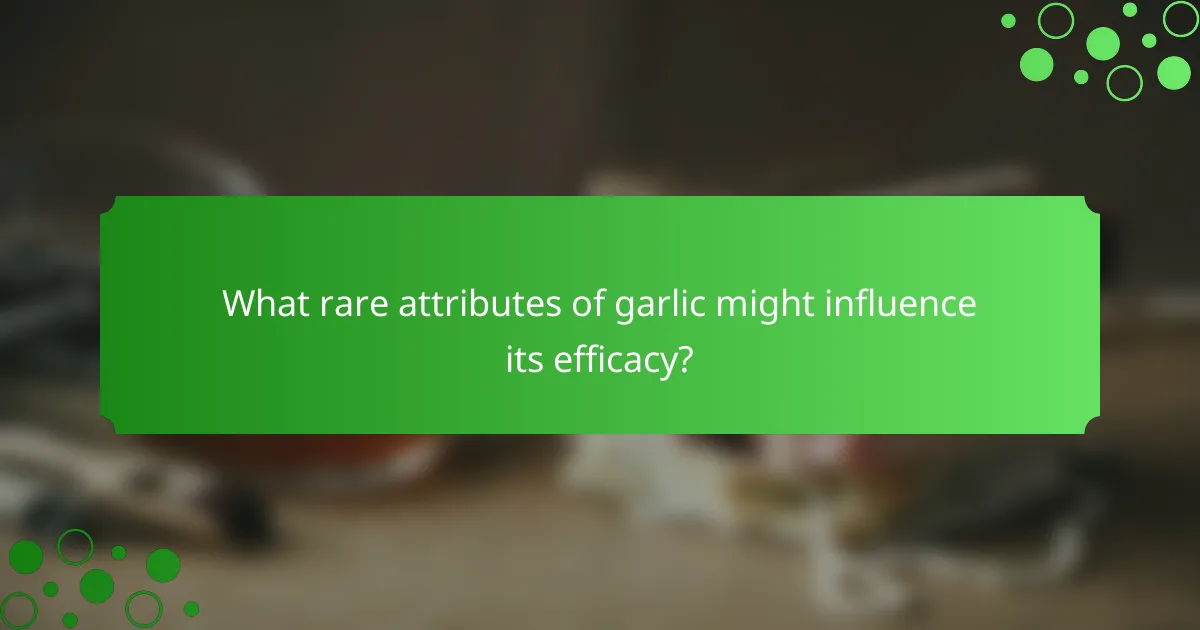
What rare attributes of garlic might influence its efficacy?
Garlic exhibits rare attributes that may enhance its cardiovascular benefits. These include the presence of unique sulfur compounds, such as allicin, which can improve blood circulation and reduce hypertension. Additionally, garlic’s ability to modulate nitric oxide levels is a rare trait that contributes to vasodilation, promoting better heart health. Its antioxidant properties also play a significant role in protecting against oxidative stress, which is often overlooked. Lastly, certain garlic varieties, like black garlic, contain higher concentrations of beneficial compounds, further influencing its efficacy in cardiovascular support.
How do environmental factors affect garlic’s health properties?
Environmental factors significantly influence garlic’s health properties, particularly its cardiovascular benefits. Factors such as soil quality, climate, and agricultural practices affect the bioactive compounds in garlic, like allicin. For instance, garlic grown in nutrient-rich soil often has higher levels of these beneficial compounds, enhancing its ability to lower blood pressure and improve cholesterol levels. Additionally, the method of consumption, whether raw or cooked, can alter the potency of these health properties. Raw garlic retains more allicin, while cooking can diminish its effectiveness. Overall, understanding these environmental influences can optimize garlic’s health benefits.
What potential interactions exist between garlic and medications for heart health?
Garlic may interact with heart medications, potentially enhancing or diminishing their effects. For instance, garlic can lower blood pressure and cholesterol levels, which may amplify the effects of antihypertensive and cholesterol-lowering drugs. Additionally, garlic’s blood-thinning properties could increase the risk of bleeding when taken with anticoagulants. Patients should consult healthcare providers before combining garlic with heart medications to ensure safety and effectiveness.
What are the best practices for incorporating garlic into a heart-healthy diet?
Incorporating garlic into a heart-healthy diet can enhance cardiovascular health. To maximize its benefits, consider these best practices:
1. Use fresh garlic in cooking to retain its allicin content, which contributes to heart health.
2. Add minced or crushed garlic to salads, dressings, and sauces for flavor and health benefits.
3. Consider garlic supplements if dietary intake is insufficient; consult a healthcare professional for proper dosage.
4. Experiment with roasted garlic as a flavorful spread on whole-grain bread, promoting heart-healthy whole grains.
5. Incorporate garlic into stir-fries or vegetable dishes to enhance nutrient intake while enjoying its benefits.
These methods ensure you enjoy garlic’s unique properties while supporting cardiovascular wellness.